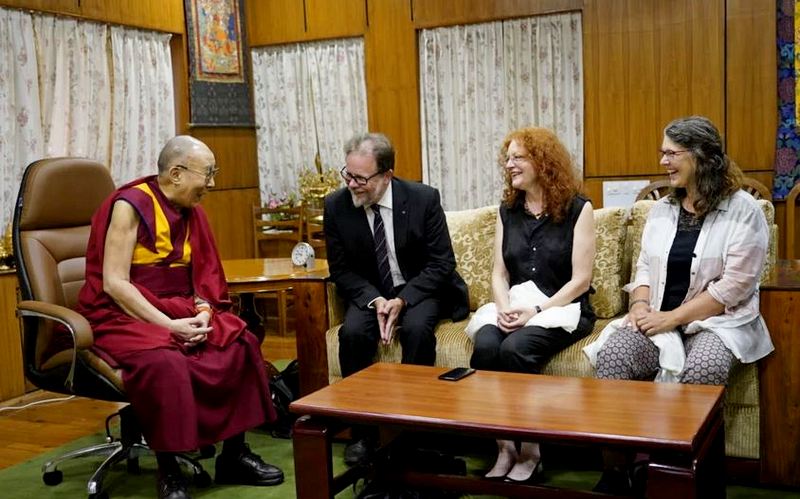Dharamshala, India — Many among top leaders of China's Government realise that their policies on Tibet have failed and are open towards a more realistic approach, so there is a hope, His Holiness the Dalai Lama told a delegation of German lawmakers recently visited Dharamshala, India.
A three-member German Parliamentary delegation met His Holiness the Dalai Lama at his residence in Dharamshala, India, on Wednesday, September 18, 2019, while reaffirming their continued support and solidarity with the people of Tibet.
The delegation was led by Members of German Bundestag, Frank Heinrich (Chemnitz) (CDU/CSU), Ute Vogt (Social Democratic Party of Germany) and Margareta Bause (Green Party). Anja Wollny (Secretariat Human Rights Committee), Anya Malhotra (Interpreter), and Simon Stross (German Embassy, New Delhi) accompanied the delegation.
Speaking to the delegation at the meeting hall, His Holiness said “Today, China has become the greatest population of Buddhists. About nearly 300 millions Buddhists, many of them follow Tibetan Buddhism. So now there is some positive situation.
"Meantime in the free world especially in Germany, every occasion you express your concern about Tibet issue and Tibetan cultural heritage and environment. It’s very useful,” the spiritual leader of Tibet continued.
His Holiness spoke briefly on China’s policy on Tibet saying many Chinese leaders recognise the policy to have failed and are open towards a more realistic approach. 'Over 70 years of China’s policy in Tibet, now they themselves realise its failure, they think they should follow a method which is a more realistic approach. Now among the top leaders that kind of new thinking we find,” His Holiness further said, adding: 'So there are some hopes'.
Responding to His Holiness, Frank Heinrich said, “When we hear you, we feel that we have represented now that we are here to complement and to see what voice we can be from your side. We risk even never to go to China again because they would not let us in because we talk to you and the President of the exile government.”
Later in the afternoon, President Dr Lobsang Sangay of the Central Tibetan Administration led Cabinet Ministers hosted the delegation for an hour and a half meeting at the Kashag Secretariat and the Tibetan government in-Exile.
President Dr Sangay urged the delegates to bring the issue of Tibet on the front-line whenever possible and also to further advocate the Tibetan cause at the helm of German Bundestag. He further elaborated on the current situation of Tibetans inside Tibet particularly the deteriorating human rights and religious freedom in Tibet. Dr Sangay also raised concerns on China’s interference in the sacred, spiritual process of reincarnation.
The Chinese Communist totalitarian regime (PRC) began their invasion of Tibet in 1949, reaching complete occupation of the country in 1959. Since that time, more than 1.2 million people, 20% of the nation's population of six million, have died as a direct result of China's illegal invasion and ruthless occupation. In addition, over 99% of Tibet's six thousand religious monasteries, temples, and shrines, have been looted or decimated resulting in the destruction of hundreds of thousands of sacred Buddhist scriptures.


![Tibet has a rich history as a sovereign nation until the 1950s when it was invaded by China. [Photo: File]](/images/stories/Pics-2024/March/Tibet-Nation-1940s.jpg#joomlaImage://local-images/stories/Pics-2024/March/Tibet-Nation-1940s.jpg?width=1489&height=878)
















